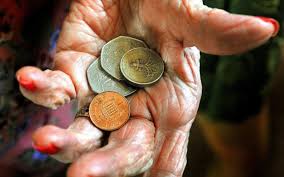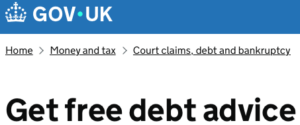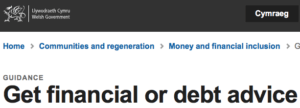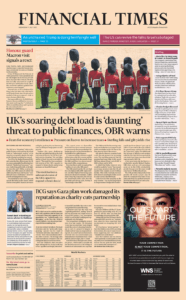- Return to sender - 20th February 2026
- Legal eagle - 19th February 2026
- Round Robin - 19th February 2026

During 23 years with the BBC, and a 41 year journalistic career (when he was trained to use clear and simple language, avoiding jargon), for our Editor, Welshman Phil Parry reporting major events has always loomed large, and often number crunching is essential (although he finds it difficult) – and this is put centre stage by new research showing the amount of debt today is at record levels.
I need to worry because numbers are tricky for me, but others should be even more concerned.
 This is underlined by figures today which show that inflation rose to a near 18-month high to 3.6 per cent in June, which was unexpected, with most economists forecasting it to remain unchanged at 3.4 per cent.
This is underlined by figures today which show that inflation rose to a near 18-month high to 3.6 per cent in June, which was unexpected, with most economists forecasting it to remain unchanged at 3.4 per cent.
Annual food price inflation hit the highest level since February 2024, while transport costs also pushed up the cost of living.
Although even I can tell that when you remember inflation in double-digits, these statistics are virtually meaningless.

New figures also show that the levels of debt (both in the public sphere and in the private one), are astronomically high – and this is NOT meaningless.
The independent Office for Budget Responsibility (OBR) has warned that the UK’s public finances are in a “relatively vulnerable position”, with pensions costs, climate change and volatile bond markets all posing significant risks.
In its annual assessment of the long-term threats to the government’s fiscal position, the OBR points out that the UK has “the sixth-highest debt, fifth-highest deficit and third-highest borrowing costs among 36 advanced economies”.

In total, the forecaster confirms its previous expectation that without policy changes, UK debt is on course to hit 270 per cent of GDP by 2070 – up from less than 100 per cent today.
The watchdog says efforts to restore the public finances in the wake of a series of big economic shocks (including the Covid pandemic and the energy crisis), have “met with only limited and temporary success in recent years”.
 Household debt too is at record levels.
Household debt too is at record levels.
It seems the UK Government is aware of this issue, and publishes information to help people, and under the headline “Get free debt advice” it declares on its website: “Get free, confidential and independent advice on dealing with debt problems.

 “This list covers UK-wide organisations and ones based in England and Wales. Find out about debt advice in Scotland or debt advice in Northern Ireland.
“This list covers UK-wide organisations and ones based in England and Wales. Find out about debt advice in Scotland or debt advice in Northern Ireland.
“You can also use the Money Helper website to find more free debt advice services.”
 In Wales it is a major controversy, and the Welsh Government (WG) proclaims on ITS website: “The Money Helper provides free and impartial money advice. It can help you plan and manage your finances and is set up by UK government”.
In Wales it is a major controversy, and the Welsh Government (WG) proclaims on ITS website: “The Money Helper provides free and impartial money advice. It can help you plan and manage your finances and is set up by UK government”.
After a 2019 report, the debt charity StepChange announced: “Based on general public polling, we estimate that around 8% of adults living in Wales are facing severe debt problems, compared to around 6% of the UK adult population.
“This equates to 193,000 people in Wales in severe problem debt. We estimate a further 412,000 (16% of the Welsh population) are showing signs of financial distress”.

The international outlook also looks bleak, and one of the worst cases is China.
As a proportion of China’s GDP, household debt has risen from less than 11 per cent in 2006 to more than 60 per cent today, close to rich-country levels.
Lenders include state-owned banks and tech platforms.
Between 25 million and 34 million people may now be in default according to Gavekal Dragonomics, a research consultancy.

If those who are merely in arrears are added, the total could be between 61 million and 83 million, or five to seven per cent of the total population aged 15 and older.
In both categories, these numbers are twice as high as they were five years ago, the firm reckons, and amid increasing youth unemployment as well as a property slump, the situation will probably only worsen.
So all in all money worries are big and becoming bigger.
My calculator will be red hot!

The memories of Phil’s astonishing, decades long award-winning career in journalism (when numbers were often crucial so always had to be checked) as he was gripped by the rare neurological disabling condition Hereditary Spastic Paraplegia (HSP), have been released in a major book ‘A Good Story’. Order it now.
Tomorrow – why the latest scandal to engulf the BBC emphasises their refusal to answer The Eye’s questions about them.









